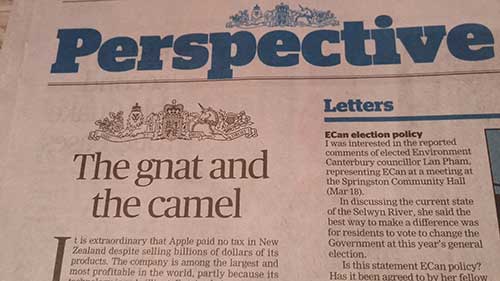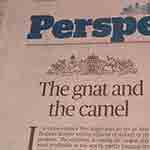
Last week I was (pleasantly?) surprised to open our city’s newspaper, The Press, to find its editorial was entitled “The Gnat and the Camel” (see above photo; text here). Since then, I have been carrying out an (unscientific) survey to see who knew what the headline alluded to.
I have tended to ask well-educated Kiwis – those with at least one university degree and many with post-graduate qualifications. The result has been pretty clearcut. Those who are regular church-goers all could identify the source as one of Jesus’ sayings. No one else could.
Woe to you, scribes and Pharisees, hypocrites! For you tithe mint, dill, and cummin, and have neglected the weightier matters of the law: justice and mercy and faith. It is these you ought to have practised without neglecting the others. You blind guides! You strain out a gnat but swallow a camel! (Matthew 23:23-24)
It didn’t matter if the person had gone to a church school – Roman Catholic or not. It didn’t matter if they were occasional church attenders. The saying was only known by regular church-goers.
I was recently talking to a reasonably-well-known Kiwi artist. In the conversation, it became clear that, without any embarrassment, this artist had no idea about Christianity (and hence of Christian, read Western, symbolism or allusions in art). In another conversation, with a graduate in a degree which included history, again – no basic framework about Christianity (and hence, from my perspective, of Western History).
If we are going to “lay blame” for lack of knowledge of Christianity, let’s at least place some of the blame on us – the Church, Christians, for our inability to get our message out in this “Information Age”. Then, let’s put some blame on our post-modern educational approach where there is no canon of truth but individual schools and individual teachers decide what the content of their courses will be (a recent example: individual schools decide whether to teach consent as part of their sex education). Thirdly, lay blame again at the door of Christians in not effectively critiquing the post-modernism that rejects a canon of agreed truth.
In this, some churches may need to get their own house in order first. In NZ Anglicanism, it is possible, as just one example, to be a priest without ever having formally studied the Reformation.
Let’s conclude by returning to Jesus’ wonderful image. He was clearly the political cartoonist of his day, the presenter of the late-night TV show which humorously pokes fun in the most pointed of manners.
The Old Testament forbids the eating of gnats:
All creatures that swarm upon the earth are detestable; they shall not be eaten. Whatever moves on its belly, and whatever moves on all fours, or whatever has many feet, all the creatures that swarm upon the earth, you shall not eat; for they are detestable. (Leviticus 11:41-42)
The image of swallowing a camel would, of course, have had Jesus’ listeners rolling in the aisles with laughter as they visualised its head visible inside the person’s stomach on one side, and legs on the other. The scribes and Pharisees wouldn’t be laughing – they got the point! But Jesus didn’t just choose the camel because it was a large, fun image. It was a pun in Aramaic on words that even looked the same:
You strain out a galma (gnat) but swallow a gamla (camel)!
If you appreciated this post, consider liking the liturgy facebook page, using the RSS feed, and/or signing up for a not-very-often email, …




Kia Ora Bosco. I largely agree, particularly for Pakeha the importance of learning their own cultural and religious history. However the “Canon” is a bit problematic. Before clergy learn the Reformation shouldn’t they learn about Mohi Turei, whose influence on Christianity here is immeasurable? And who gives us a way forward for our faith in this land and in our context. And if anyone’s wondering who Mohi is…
Kia Ora, Hirini. I tautoko your point. I don’t think it is either-or. In this land, we need to know both Martin Luther and Mohi Turei. Arohanui!
Bosco, as something of an aside, do you consider Judaism a part of the Western Canon? And where do we place Islam?
I would say that to be an educated person in the West, Kevin, one should have at least a foundational understanding both of Judaism and of Islam. Blessings.
I might add, more to the point, that I don’t think that Matthew 23:23-24 is in the RC Sunday Lectionary. (Might someone correct me if I’m wrong, please.)
Wow! Kevin! I’ve never spotted that. It is not, as far as I can see in the three-year Sunday lectionary (that is neither the RC nor the RCL). Blessings.
I’d always assumed some study in Church History was compulsory for ordination. Certainly the ministers in our denomination are all familiar with the subject (and happy to answer the various questions this self-educational lay person might have). How can we understand what we believe until we know the history of why we believe it? Perhaps that might explain the emergence of some groups citing doctrines the mainstream churches have considered and rejected in past generations.
There are several parts to your comment, Claudia. NZ Anglicanism cannot agree on what is required for ordination. Theology degrees might require “some study in Church History” – but not specify what that “some” refers to. You are right – it’s pretty difficult to think of a new heresy 🙂 As an aside, in case you are wondering, my own theology degree includes every period of Church History, History of Christianity in the Pacific, in this land, History of Ecumenism, of Spirituality,… Blessings.
I’m not sure that post modernism can be blamed. One statistic that stuck in my mind from a university survey of world religions course back in the mid 1970s (i.e. before post modernism got going) was that only a quarter of American students surveyed could name the four gospels.
Thanks, Robert. We could have an interesting discussion about the history of post-modernism. What would be your own explanation of your 1970s statistic? Do you think it was the norm or an exception? Blessings.
The statistic stuck in my mind because I was still at the stage of being shocked that not everyone knew what I thought everyone knew.
Since I had and have very little first hand knowledge of America other than the media’s presentation, I don’t really have a context to put the statistic in except to say that it appears that not everyone who thinks of themselves or who others think of as a Christian knows the Bible very well.
Yes, Robert. And you and I wouldn’t regard knowing the names of the four gospels as “knowing the Bible very well” 🙂 Blessings.
As the young lad asked – “What about the flea?”
Well, I consider myself to be an educated person and I was certainly aware of the expression and its origin. That may be due to my age; being in my 70s, I’m from a time, and a background, when “education” actually existed.
I can quote from the Bible and Classical writers with the best of them, and I speak five languages fluently – two of them with non-Latin alphabets.
Does that make me a “regular church-goer”? I’m afraid that I don’t fit into the informal research results mentioned in the article: being able to quote from the scriptures doesn’t mean that one has to believe in hocus-pocus and arrant superstition, I’m afraid.
I agree 100%, Jim – being able to quote from the scriptures doesn’t mean that one has to believe in hocus-pocus and arrant superstition.